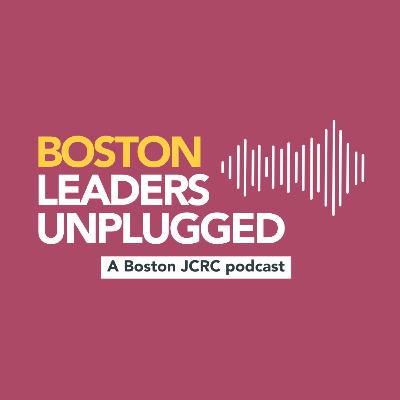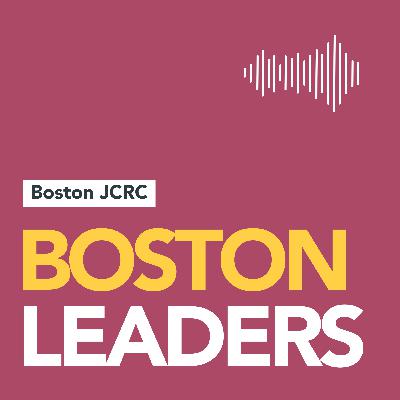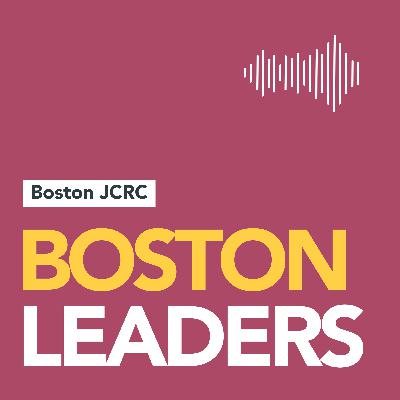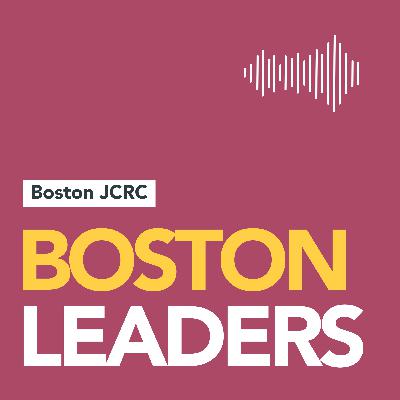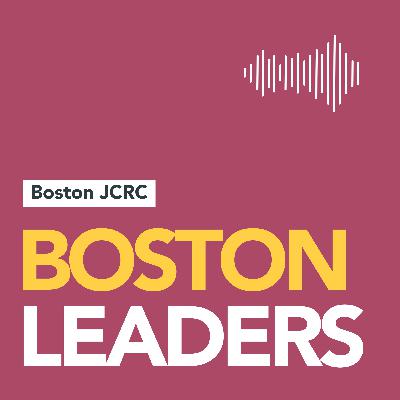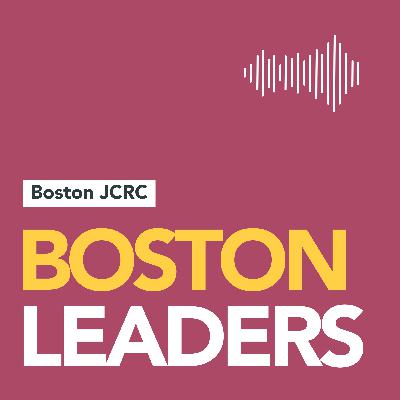Discover Boston Leaders Unplugged
Boston Leaders Unplugged

Boston Leaders Unplugged
Author: Boston JCRC
Subscribed: 0Played: 0Subscribe
Share
© Boston JCRC
Description
Real conversations with the voices who shape our community.
For 80 years, we've led critical conversations for the Jewish community, and now, we're bringing them to you. Tune in as we share insights, engage with leaders and changemakers, and dive into the discussions shaping our future.
For 80 years, we've led critical conversations for the Jewish community, and now, we're bringing them to you. Tune in as we share insights, engage with leaders and changemakers, and dive into the discussions shaping our future.
9 Episodes
Reverse
How can we help young people talk with each other instead of at each other — and help schools move from a fear of “getting it wrong” to genuine inclusion for Jewish students?In our latest episode of Boston Leaders Unplugged, JCRC’s Spencer Cronin talks with Shira Hoffer, founder and executive director of The Viewpoints Project, a nonprofit teaching young people to “disagree curiously.” Together, they explore how thoughtful dialogue can change classroom culture — why goals matter (debate vs. dialogue), how small phrasing shifts (“do you think” beats “don’t you think”) can make a big difference, and why near-peer mentors often have the greatest impact.Check out more from The Viewpoints Project.
In this powerful — and emotional — Pride Month conversation, we sit down with Idit Klein, founding CEO of Keshet, to reflect on her 24-year journey transforming LGBTQ+ inclusion in Jewish life.What began in a Boston apartment became a national force for change — mobilizing the Jewish community to help secure marriage equality in Massachusetts (where the Boston JCRC proudly became the first JCRC in the country to publicly support equal marriage), a milestone moment driven by Keshet's work.That unified advocacy helped defeat a constitutional amendment and made Massachusetts the first U.S. state to legalize same-sex marriage.Keshet went on to activate Jewish communities across all 50 states to support the Equality Act, advocating for federal protections for LGBTQ people and mobilizing clergy, synagogues, and grassroots supporters across the country.Idit shares how Keshet built community, shaped culture, and empowered a generation — from challenging Jewish institutions to move from ignorance, to tolerance, to full embrace; navigating painful rifts in progressive spaces post-October 7; and standing firm for trans youth in a moment of rising hate.As she steps back from leading Keshet, Idit reflects on what it takes to build something lasting, what’s next for Keshet, and what’s next for her.The film that started it all: https://www.keshetonline.org/hineini-coming-out-in-a-jewish-high-school/
PLEASE NOTE: This episode was recorded before two recent antisemitic attacks: the tragic murders of Sarah Milgrim and Yaron Lischinsky, two young Israeli Embassy staffers fatally shot outside the Capital Jewish Museum in Washington, D.C., on May 21, 2025; and the Molotov cocktail attack on a peaceful Jewish gathering in Boulder, Colorado. While these horrific incidents are not referenced in the conversation, they underscore the urgency of the themes we explore — defining antisemitism, educating to prevent it from becoming dangerous and deadly, and empowering the next generation to confront it with courage.Gabi Schiller, New England High School Regional Manager at StandWithUs, is on a mission to ensure that Jewish students can show up fully and authentically in their schools. In this episode, she shares how StandWithUs equips high schoolers with the tools, language, and confidence to proudly express their Jewish identity; help their peers understand the breadth of Jewish experience; and educate others on what kind of rhetoric constitutes real harm — and what rhetoric can lead to it.We also dig into one of the most contested issues in today’s discourse: How do we define antisemitism? We break down why the IHRA (International Holocaust Remembrance Alliance) working definition of antisemitism can be a useful tool as a non-legally binding working definition, and why it’s viewed by some as controversial. We explore what IHRA actually says (and doesn’t say), why it doesn't suppress free speech or criticism of Israel, and why those in progressive spaces may recommend alternate definitions.
Since October 7, many American and Israeli-born Jews — especially students in K–12 schools — have faced traumatic invalidation: the dismissal of their pain and lived experiences. This isn’t just an unfortunate side effect of rising antisemitism — it’s one of the ways antisemitism actively operates. Dr. Miri Bar-Halpern, an expert in trauma-informed interventions, joins Jeremy Burton to explore how antisemitism causes harm and denies that harm, deepening trauma.They also discuss how trauma can be a driving force in radicalization. Through her work at Parents4Peace — an organization that includes former extremists such as a neo-Nazi and a jihadist who now work to prevent violence — Dr. Bar-Halpern has seen firsthand how unaddressed trauma can push individuals toward extremist ideologies. What does evidence-based research tell us about breaking these cycles of harm before they take root?Mental health is a key part of this work and a JCRC legislative priority. Addressing trauma — both individual and communal — is essential as we confront antisemitism. This includes ensuring that K–12 schools become trauma-informed spaces where Jewish students feel safe and supported. How can the Special Commission on Combatting Antisemitism help make that a reality?This conversation unpacks what’s happening, why it matters, and how we can push back against both antisemitism and the psychological wounds it inflicts.
Why is it that the majority of people — even those who consider themselves to be civically engaged — are no longer aware of who is actually effecting change in their communities? We sat down with Eitan Hersh, professor of political science at Tufts; whose research focuses on US elections and civic participation, to uncover how the generational shift in local influence and in perceptions of local influence can impact the long-term health of our community.
In this episode, we take a closer look at how JCRC operates as the voice of Greater Boston’s Jewish community in civic and interfaith spaces. CEO Jeremy Burton breaks down the unique role of our Council — comprising representatives from 40 diverse member organizations that make up most of our Jewish community's landscape — in shaping our positions and guiding our engagement with broader society. Learn how we convey the diverse voices of our community as one while navigating the complex issues that our community grapples with.
See JCRC's list of member organizations here.
In this episode, we explore the advocacy, policymaking, and community efforts that have made Massachusetts a leader in gun violence prevention. Find out how gun safety extends beyond simply regulating access, to include community-driven solutions with a more lasting impact.
In this episode, we dive deep into our recent policy wins, breaking down over $12 million in state budget allocations that JCRC successfully advocated for this year. From creating a new commission combating antisemitism to expanding genocide education and securing vital funding for nonprofit security, this episode highlights how our policy work comes to life — and why it matters for the Jewish community in Massachusetts.
We sat down with Benny Sharoni, the new Israeli Consul General to New England. We discuss why he chose Boston as his diplomatic home base, his vision for the region, and how it plays a pivotal role in Israeli relations. (We may even have some advice to share...)


